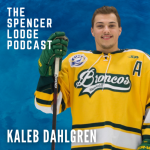Introduction
Healing from trauma requires strength, resilience and determination. Kaleb Dahlgren, a Canadian ex-hockey player and author, embodies all of these traits, and you’ll find out why in this episode.
In 2018, Kaleb was on a bus with his team following a hockey game in Saskatchewan, Canada, when their bus collided with a truck. Kaleb survived the accident, but it resulted in the tragic deaths of 16 of his hockey teammates and left another 13 people injured. Kaleb experienced amnesia following the crash, and suffered from a major brain injury that still affects him.
Kaleb has documented his experiences of the deadly Humboldt Broncos bus crash and healing from trauma and grief in his book, “Crossroads”. Leaning on the lessons he learnt about grief, healing and resiliency, Kaleb strives to help others to overcome difficult times through his book.
On today’s episode, Kaleb will discuss the horrific crash that changed his life. He will also talk about the miracle of being alive, living for those who have passed, and the importance of finding the right perspective on the path to healing.
Show Notes
Kaleb joins the show by discussing ice hockey. [2:32]
The tragic events on April 6th 2018 are detailed. [3:34]
Kaleb describes how he woke up in the hospital and the events immediately after the crash. [7:04]
Injuries Kaleb sustained during the crash are detailed. [10:39]
Kaleb explains how he coped with his emotions following the crash. [13:34]
Kaleb explains how he handles grief and the advice he would give to others going through the loss of a loved one. [17:45]
The memorial tattoo that Kaleb has on his arm is talked about. [21:48]
“Crossroads”, Kaleb’s book that describes his life experiences, is touched on. [25:33]
Kaleb’s recent retirement from ice hockey is discussed. [28:38]
Kaleb talks about his life goals and his future. [34:21]
Quotes
“Just another ritual, normal day. It is just what you would do on any typical game day. Then, after I put my headphones in, pressed play and put my head down, everything went black, and that was the last thing I remember.” [5:24-5:37]
“So he came back, got me on a stretcher and then as he loaded me into the ambulance I said ‘thank you, make sure you help others.’ He said he will never forget that.” [7:46-7:54]
“I should be in a vegetative state, not remembering my name, or how to walk, or how to talk.” [12:52-12:57]
“Why am I still here when the person beside me, the person behind me, passed away?” [14:21-14:27]
“I found that everyone heals differently. There is no linear path to healing.” [20:33-20:27]
“The image came back and the MRI was the exact same, so that was when it really hit me about how severe my brain injury was, how fortunate I was to be in the position I was, and then that’s when I took a step back from hockey and re-evaluated my life.” [33:18-33:32]
Social Links
Twitter: https://twitter.com/kalebdahlgren?lang=en
Instagram: https://www.instagram.com/kalebdahlgren/?hl=en
Link to Kaleb’s Book: https://www.amazon.ca/Crossroads-Kaleb-Dahlgren/dp/144346287X






